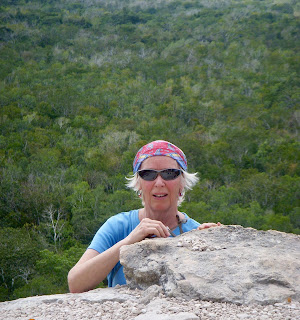September 12 - 17, 2016
It isn't correct to say I wish I could
live on Cape Breton Island, Nova Scotia. That would mean I'd have to relocate and be an outsider, an elderly one at that. I'd be an old wannabe.
What I wish is that I'd been
born there. I wish I'd grown up immersed in Celtic music and dance, as it seems a good percentage of the natives are, to one degree or another. And, at the same time, lived close to the land and the sea depending not too much on the outside world for entertainment. Living close to nature but never far from robust music that permeates the culture, makes dancing irresistible, and is my idea of heaven.
On top of everything else, Nova Scotia offers one year of free university education for welfare recipients! http://www.cbc.ca/news/canada/nova-scotia/welfare-assistance-university-community-college-books-tuition-aid-community-services-1.3825959
I've traveled far and wide during the past decade, experienced many countries and a few continents, and I've never felt such a visceral response to a place.
Well, except for Africa. But I never saw myself living there.
I'm embarrassed to admit that it only took a few days on Cape Breton for me to achieve a state of longing and regret, longing for the simple, beautiful music and dance-centric life I believe exists there, and regret that I discovered too late this model of living. My assessment is based entirely on my subjective responses to the island's largely unblemished beauty and a pervasive musical presence that does not depend upon going to a bar or a concert.
 |
| These symbols, which were part of a campground's signage, pretty much sum up the island's priorities: music first, then hiking, camping, boating, and, oh ya, connectivity. Although Cape Breton seems to be a place unto itself. |
What's the deal? Nova Scotia is beautiful, but I live in southern Oregon, and several places within a couple hours of home rival anything I've seen anywhere.
On September 17 we woke up on a pristine beach a few miles outside the village of Mabou, Cape Breton, along the Ceilidhs (sounds like
Keelee) Trail in Nova Scotia. The night before, we'd feasted and fested in an unassuming restaurant/bar in Mabou called The Red Shoe. We were thinking about "camping" in the big parking lot of the community center across the street.
A young couple from Montreal, who we'd been hopscotching with along the Cabot Trail, said, OH NO! Don't stay there. Then told us about the beach, part of a provincial park. No campground per se, but a Canadian provincial park
It had been a big day, really.
When we'd entered Cape Breton about a week earlier, a Visitors' Center employee got all worked up when we expressed an interest in the island's music scene and circled a half dozen specific restaurants, bars, or clubs on the map where we'd be sure to hear live music
I stretched and smiled at the sunrise and said, as Paul is my witness,
I wish I'd been born here.
Not on the beach, but one of the magical places on earth where music and dancing, family and community, create a universe. I know there must be many cultural pockets like this around the world, but I am happy to have encountered this one.
New Orleans, which we've visited numerous times, is another music culture but has some serious problems, like one of the highest murder rates in the nation. We were made aware of that one night walking, with another couple, from the popular French Quarter to our hotel a couple miles away. It was about 2 a.m. We took a shortcut, remarking that "this is really a dead neighborhood." Not a person or vehicle was to be seen until a compact car drove slowly by, then backed up, and through a crack in the window, a young (white) woman said, "Run! Don't walk! You're in a
kill zone!"
What? We're rural Oregon hicks. We don't know about "kill zones."
I was born in Iowa and grew up in Minnesota and North Dakota. And then lived in the Midwest until my mid-twenties, when I ended up on the Oregon coast. I know that Iowa, the Midwest, and Oregon have changed immensely in 70(!) years. But what about the Kayla coast of Cape Breton? How long has music been central to its culture? I recall polkas and square dances in towns where we lived, but my family wasn't part of that.
Beatty sisters
https://www.youtube.com/watch?v=cs2j8f7H2WY
















































